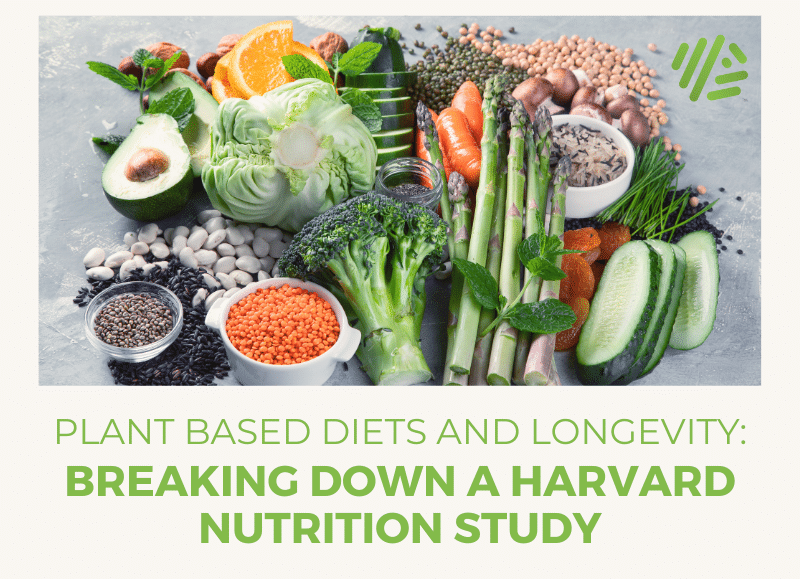Animal Protein vs. Plant Based Diets: What is Best for Longevity?

Contents
A big part of the reason I became involved with Gene Food was to help people understand that nutrition advice shouldn’t be one size fits all. What works for some, won’t work for others. Simply, my goal for today’s post is to add some context to the question on everyone’s mind: can we eat meat in moderation and be healthy?
My blog today was inspired by a Harvard study on plant based diets.
Harvard nutrition studies
Out of the division of gastroenterology in the Massachusetts General Hospital resides a team of Harvard scientists who believe the final consensus about plant-based diets and longevity has been established, and that the best course for longevity is a plant based diet. The Massachusetts General Hospital is regarded as one of the top two schools of medicine in the United States and a flagship for Harvard Medical School. But have these researchers really established the primacy of plant based diets? The title their research study is ambitious: Association of animal and plant protein intake with all cause and cause specific mortality. Let’s dive into the study.
One interesting thing about this study is that they had to publish a correction, and retract some facts, based on peer review, which for those of you who aren’t familiar, is review among objective medical colleagues after a study has been completed. This is a standard practice in medical research, and the corrections cited in the addendum to the study are relatively minor, but still worth noting.
The Harvard JAMA Study
The study was completed in October, 2016 and was published in one of the top 3 medical journals, The Journal of the American Medical Association. In other words, despite some corrections, the study is current and comes from a from a credible group of medical scientists, and has undergone a stringent review process. What did the scientists do? They studied connections between disease, death rates and diet. The focus was macronutrient intake, and how different diets correlate with health and longevity.
Plant based diet decreases risk of death?
The authors of this study make a clear and bold statement: they claim they have determined what is the relative risk of dying, i.e. mortality, from following a plant-based diet vs. a diet with consumption of animal food.
Epidemiological studies
The study was a “prospective cohort based study” which ran over 18 months. This means the study was designed to capture diet and health care data over the study period and then identify any associations rather than placing people into different groups and assigning them a particular diet. The number of participants over a more prolonged period of time is the important feature of the study. At the end of the day, it’s virtually impossible to assign a strict diet to two massive groups of people, keep them on it for years, and then track results, so what you get instead are these food frequency questionnaire studies – called epidemiological studies. Remarkably, the data was derived from 131,342 participants, which is a huge number. Results were obtained from 2 large population-based studies.
The first is the Nurses’ Health Study, which tracked participants for 32 years from 1980 to June 1, 2012. The second study was the Health Professional’s Follow Up Study, which went from 1986 for 26 years until January 31 of 2012. The study was validated by using questionnaires which specifically looked at frequency of individual components of the participants’ food intake. The questionnaires asked for the amount of animal and plant proteins consumed. How often do you eat chicken? How often do you eat beans and legumes? It should be noted that there is concern among many commentators that the results from food frequency questionnaires tend to be inaccurate and only have validity when risk ratios are off the charts. 1 Of the population studied, about two thirds were women, but analysis suggested that this did not affect the statistics. The intake of macronutrients was determined by the percentage of energy. The average protein intake, based on percentage of energy, was 14% for animal protein and 4% for plant proteins. All of the information was adjusted for lifestyle and dietary risk factors. The authors state that:
Higher animal protein intake was positively, whereas plant protein was inversely, associated with mortality, especially among individuals with at least one lifestyle risk factors. Substitution of plant protein for animal protein, especially from processed red meat, was associated with lower mortality, suggesting the importance of protein source.
Let’s have a look at the actual figures to see exactly what sort of effect we’re talking about.
The data on meat based vs. plant based diets
A meat based diet was associated with a 2% increase in overall mortality risk and specifically an 8% increase in risk of death from cardiovascular disease. Conversely, a plant rich diet was associated with a 10% reduction in overall mortality risk and a 12% reduction in cardiovascular risk. Now in the study these figures are presented as hazard ratios, which we’ve converted to percentage increases. Hazard ratios aren’t that tricky to understand, as they describe the risk of an event occurring, so a hazard ratio of 2 would mean a particular event is twice (+100%) as likely to occur. The most important thing to understand about hazard ratios however is that they relate only to the period studied. So in this case the risks described only apply to the 18 months the study covered. What effect these diets will have in the longer term remains unknown, and might never be well understood due to difficulties tracking this many people over that length of time.
| Diet Type | All Cause Mortality (18 mnths) | Cardiovascular Mortality (18 mnths) |
| Animal protein rich | +2% | +8% |
| Plant protein rich | -10% | -12% |
While the impact of animal protein on all cause mortality was negligible, the effects for cardiovascular risk for both diets, and plant protein rich diets on all cause mortality were actually quite dramatic, especially when you consider the relatively short time period the study was conducted in. However, there is one piece of the picture which is missing which significantly mitigates the effects the authors describe.
Plant based diet has best data for those with illness or risk factor
The study makes it clear that that all of the associations noted above were confined to individuals that had already had one unhealthy lifestyle factor. What are these lifestyle factors?
- Obesity or overweight
- lack of physical activity
- Significant alcohol intake
- Smoking
If you eliminated these patients from the analysis, there were absolutely no statistically significant differences in the overall risk of heart attacks and strokes or the overall risk of mortality from all causes. So the headline statement about plant and animal diets is actually not quite as dramatic as you may initially think on reading the authors statement. But the fact that lifestyle factors can have such a significant impact also suggests that there are likely some genetic determinants as well.
Key takeaways
So to summarize, the data presented in this paper suggests that a plant based diet may be of significant benefit if you’re not doing great health wise. If you are healthy, then the effect becomes negligible, although going out and loading up on animal protein isn’t advisable either. Almost every blue zone, regions of the world where people routinely live to be 100 years old, consume meat, but they do so on average about once a week, and in small portion sizes. And everyone can agree that processed red meat is bad for you, period. What would be of great interest would be to see what effect plant based diets have over a much longer period of time. Here we might begin to see an effect in otherwise healthy individuals… or we may not.




The environmental advantage of reduced meat consumption should not be understated.
Love what you’ve done here… It’s great to see supported research instead of opinion.